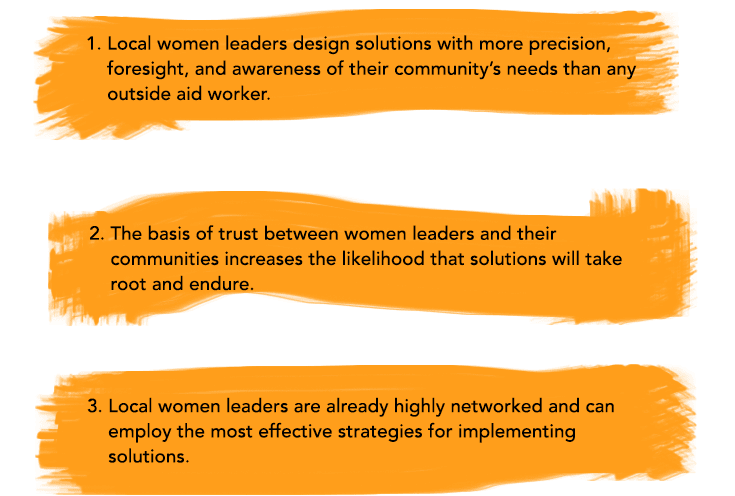Beyond business as usual.
WEA’s vision is that the women worldwide who are safeguarding a thriving home for all of us, are never alone, and that they have what they need—not only to survive but to thrive.
A vibrant grid of micro-networks has been built by women over years and across borders to guard and nourish our earth. Community by community, women step forward to defend forests from being stripped bare, prevent children from dying of waterborne illness, and uphold cultural fabric in the face of violence and exploitation. WEA lights this grid of connectivity.
Our mission is to equip women with the skills and tools they need to protect our earth and strengthen communities from the inside out. We work with leaders who build up other leaders. One becomes two, two become four, four become eight, and millions.
Why is it essential to include women in strategies for change?

Traditional development models rest on the belief that there are those who “have” and those who “have not.” And those who “have not” need stuff, need help, and need to be improved. WEA’s truth is: When availed of freedom and access, community leaders have the vision and will to design and implement the most appropriate and long-lasting solutions. WEA’s work unleashes this existing leadership. We aren’t serving beneficiaries, we are connecting leaders to each other and to the skills and tools they need to protect our earth and strengthen communities from the inside out. We work with leaders who build up other leaders.
The Back Story
WEA’s founding leaders spent years working in international development settings, and we saw many things that didn’t work. We saw development projects waste millions of dollars in failed attempts that didn’t address root causes or solicit community input. We saw programs attempting to help underserved communities instead perpetuate inequity and dependency by funneling aid without harnessing local knowledge. The stories often had the same ending: Local communities were left out of the process, money was wasted, and projects failed.

Perhaps the most ironic mistake we observed was that these development and environmental strategies consistently left out women. Sure, women were cited as “target beneficiaries” but their critical contributions to food security, water access, community health, and climate adaptation were consistently overlooked, underfunded, and de-prioritized. Including gender equality as a UN Millennium Development goal was significant but not enough, as it often did not translate to real change.
Years later, women leaders are still doing the majority of the work to ensure our world’s water is clean, food is secure, and communities are safe. Many still struggle to access training, funding, economic opportunity, and decision-making power. As a result, communities suffer, natural resources degrade, and the fabric of societies unravels.
We started WEA with the hope of designing a fresh model that would benefit everyone. After all, stability in communities worldwide contributes to everyone’s health and safety on this earth. Without clean water, land to grow food, or forests to provide life, there is unrest. And we are all impacted, regardless of where we live. A planet where all people’s basic needs are met is possible. We just need to go back to the source—our world’s women—and make sure women are sourced.
"Advancing gender equality, through reversing the various social and economic handicaps that make women voiceless and powerless, may also be one of the best ways of saving the environment…The voice of women is critically important for the world's future—not just for women's future."
